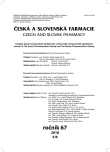-
Články
- Časopisy
- Kurzy
- Témy
- Kongresy
- Videa
- Podcasty
Beer with reduced carbohydrates and alcohol content suitable for diabetics
Authors: Aleš Franc; Jan Muselík; David Vetchý
Published in the journal: Čes. slov. Farm., 2018; 67, 212-215
Category: Krátké sdělení
Summary
eer is for it’s glycemic index and for alcohol content inappropriate drink for patients with diabetes mellitus. Traditional social habits, however, lead diabetics to drinking the beer and it has negative health effects in these patients. On the other hand, beer contains substances with a beneficial health effect, such as flavionoids, saponins, prebiotics, vitamin B complex and others. Also, for its isotonicity with blood and a suitable pH value the beer is appropriate for supplementation of liquids during physical activities. Therefore, the beer with reduced content of sugar and alcohol could be a desirable functional food not only for diabetics. While there are both low-sugar beers and low-alcohol beers on the market, “non-alcoholic diabetic” is not yet commercially available. In this research we present the method of beer production by vacuum distillation with an alcohol content less than 1.2 vol % and with a maximum of sugar content not more than 0.75 g/100 ml.
Keywords:
Beer – diabetes – low content – Carbohydrates – alcohol
Zdroje
1. Basařová G. Jak se vyrábí nízkoalkoholické a nealkoholické pivo? Vesmír 2005; 84, 220–225.
2. Bamforth C. W. Beer, carbohydrates and diet. J. Inst. Brew. 2005; 111, 259–264.
3. Karen I., Svačina Š. Diabetes mellitus. Doporučené diagnostické a terapeutické postupy pro všeobecné praktické lékaře 2018. Společnost všeobecného lékařství ČLS JEP, Praha 2018.
4. Vyhláška Ministerstva zemědělství 57/2003 Sb.
5. Jurková M., Olšovská J., Čejka P. Stanovení cukrů a celkových sacharidů v pivu. Kvasny prum. 2018; 64, 58–64.
6. Szabó M. Studie advance – větev léčby glykémie: význam intenzivní intervence hyperglykémie pro rozvoj vaskulárních komplikací diabetu. Med. pro Praxi 2009; 6, 17–21.
7. DiMeglio D. P., Mattes R. D. Liquid versus solid carbohydrate: effects on food intake and body weight. Int J. Obes. Relat. Metab. Disord. 2000; 24, 794–800.
8. Emanuele N. V., Swade T. F., Emanuele M. A. Consequences of alcohol use in diabetics. Alcohol Health & Research World 1998; 22, 211–219.
9. Harjutsalo V., Forsblom C., Groop P. H. Time trends in mortality in patients with type 1 diabetes: nationwide population based cohort study. BMJ 2011; 343, d5364.
10. Černý M., Černohorský V., Stichauer J. Janík P. Process for producing semi-dark beer for diabetics. Patent CS 277 516 B 6, priorita: 10. 12. 1990.
11. Berdelle H. P. Alcohol-free drink prepn by lactic acid fermentation of plant substrate with limited sugar consumption. Patent DE 2 212 263, priorita 14. 4. 1972.
12. Brányik T., Silva, D. P., Baszczyňski, M., Lehnert, R., Silva, J. B. A review of methods of low alcohol and alcohol-free beer production. J. Food Eng. 2012; 108, 493–506.
13. Potěšil V., Zedek V. Výroba nealkoholického piva vakuovou destilací. Kvasny prum. 2008; 54, 149–151.
Štítky
Farmácia Farmakológia
Článek Nové knihyČlánek Autorský rejstřík
Článok vyšiel v časopiseČeská a slovenská farmacie

2018 Číslo 5-6-
Všetky články tohto čísla
- Společně zpracované pomocné látky pro přímé lisování tablet
- Komplexy kovov v medicíne a farmácii – minulosť a súčasnosť I
- Nevyužívaná léčiva a jejich finanční dopad na zdravotní systém v České republice
- NMR a IR analýza přírodních látek izolovaných z léčivých hub Cordyceps
- Zapojení klinického farmaceuta do managementu pádů u polymorbidního geriatrického pacienta s opakovanými pády v anamnéze
- Pivo se sníženým obsahem cukru a alkoholu vhodné pro diabetiky
- The beginnings of health libraries of the Czech Brothers Hospitallers in the 18th century
- Emeritní děkan a bývalý předseda ČFS profesor Luděk Jahodář slaví sedmdesátku
- Životné jubileum Márie Kohútovej
- Nové knihy
- Autorský rejstřík
- Česká a slovenská farmacie
- Archív čísel
- Aktuálne číslo
- Informácie o časopise
Najčítanejšie v tomto čísle- Pivo se sníženým obsahem cukru a alkoholu vhodné pro diabetiky
- Komplexy kovov v medicíne a farmácii – minulosť a súčasnosť I
- Společně zpracované pomocné látky pro přímé lisování tablet
- Zapojení klinického farmaceuta do managementu pádů u polymorbidního geriatrického pacienta s opakovanými pády v anamnéze
Prihlásenie#ADS_BOTTOM_SCRIPTS#Zabudnuté hesloZadajte e-mailovú adresu, s ktorou ste vytvárali účet. Budú Vám na ňu zasielané informácie k nastaveniu nového hesla.
- Časopisy



